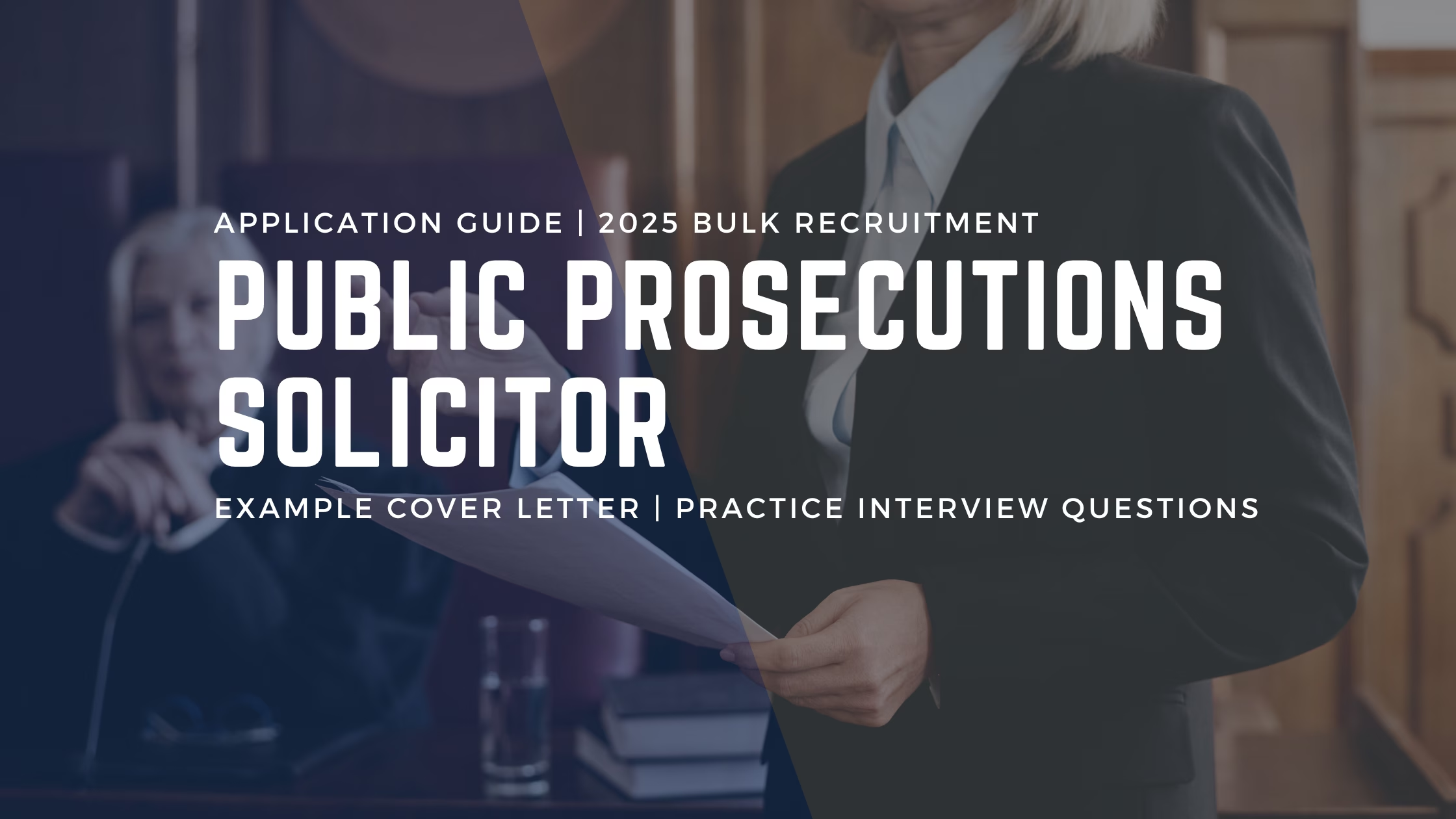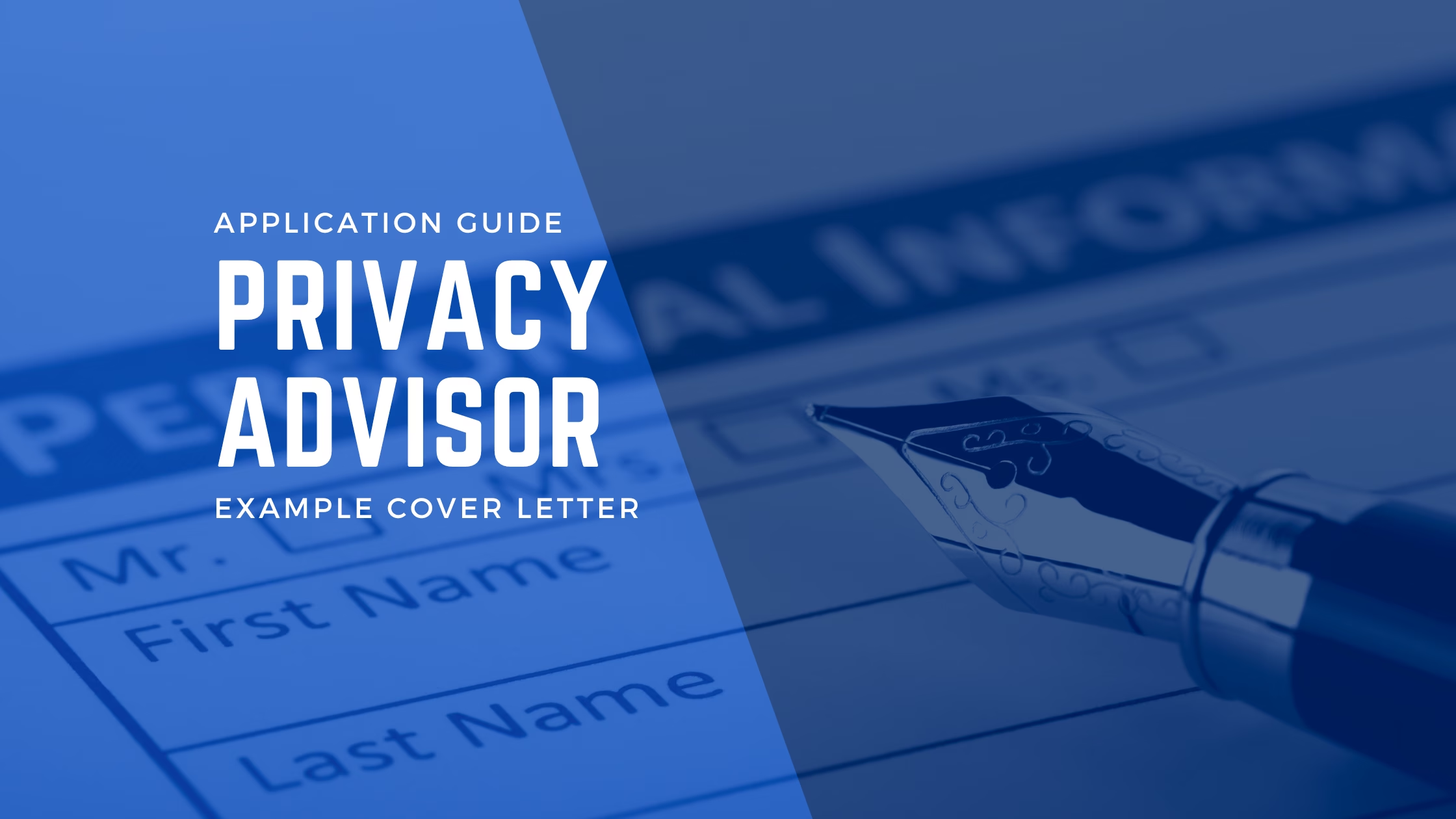The Public Prosecutions Solicitor is a dynamic legal role within the Office of the Director of Public Prosecutions (ODPP). You will handle a variety of criminal law matters, providing essential prosecution services on behalf of the people of New South Wales. From reviewing briefs of evidence to supporting Crown Prosecutors in court, this position offers an immersive experience in the realm of criminal law in NSW.
If you are a qualified lawyer who wants a public sector role, this is a great opportunity to join. This recruitment is a large state-wide recruitment for any vacancies across the State throughout the rest of the year.
I’ll help you with your application by spelling out what you need to submit before the closing date. With an example cover letter for inspiration, let me take the guess work out of how to apply for government lawyer roles.
Table of Contents
Public Prosecutions Solicitor Job Overview
| Position Title | Public Prosecutions Solicitor |
| Organisation/Entity | Director of Public Prosecutions, Office of the |
| Job Location | Statewide (Sydney City, Western Sydney, and Regional NSW) |
| Work Type | Temporary (for up to 12 months) |
| Base Pay | $88,050 – $115,816 per year (plus super and annual leave loading) |
| Closing Date | 10/02/2025 – 11:59 PM |
What Does A Public Prosecutions Solicitor Do?
Stepping into the role of Public Prosecutions Solicitor means becoming an integral part of the ODPP, the independent prosecuting authority in NSW. This agency plays a critical role in the administration of justice, conducting prosecutions for serious offences under state law. As a Public Prosecutions Solicitor, you’ll manage a diverse caseload that spans different criminal courts, from local matters to higher jurisdictions.
You will be working on briefs of evidence, liaising with law enforcement and other legal professionals, and possibly supporting Crown Prosecutors in complex trials. Because the ODPP has offices in metropolitan areas—such as Sydney, Parramatta, Penrith, and Campbelltown—and in regional NSW—including Lismore, Newcastle, Gosford, Wagga Wagga, Dubbo, and Wollongong—there are numerous opportunities to build a robust public service career. Whether your interest lies in advocacy work, complex litigation practice, or simply gaining multifaceted legal experience, this role has much to offer.
Aspiring to be a Public Prosecutions Solicitor means you will face several professional challenges:
- Complex Caseload: You may juggle multiple cases simultaneously, requiring strong organisational skills to ensure timely reviews of briefs of evidence.
- Strict Deadlines: Being part the NSW government often involves meeting rigorous court timelines, leaving little room for error.
- High-Stakes Environment: As an independent prosecuting authority, the ODPP’s work directly impacts public safety and justice outcomes.
- Diverse Stakeholders: You’ll interact with police officers, victims, witnesses, and court personnel, requiring you to adapt your communication style effectively.
These challenges demand a keen eye for detail, advanced communication abilities, and a willingness to refine your legal practice techniques continuously. By embracing these demands, you can transform challenges into stepping stones for career growth.
Why This Is A Great Opportunity In The NSW Public Sector
Here are the top reasons why I think this is a great opportunity:
- Statewide Recruitment: Multiple vacancies across Sydney, Parramatta, Penrith, Campbelltown, Lismore, Newcastle, Gosford, Wagga Wagga, Dubbo, and Wollongong.
- Entry-Level Pathway: Ideal for new lawyers—if you’ve started in private practice or a specialist role and it’s not the right fit, or if you’re looking for your very first qualified legal position.
- Talent Pool: Successful applicants can be considered for ongoing or temporary roles throughout the year.
- Criminal Law Immersion: Gain a broad understanding of NSW criminal law with exposure to diverse offences, procedures, and prosecutorial strategies.
- Work-Life Balance: Though the role is demanding, public sector positions often include structured benefits and a supportive environment for professional growth.
If you’re unsure how your current skill set translates to criminal law, the ODPP offers comprehensive training. Whether you’re fresh out of a graduate program or shifting from another legal area, this is a chance to broaden your horizons.
Public Prosecutions Solicitor Application Requirements
To help you stand out in a competitive field of NSW government jobs, you need a focused approach to your application.
Below is a breakdown of key components on what you need to apply successfully for this role.
When you apply for this Public Prosecutions Solicitor role, be prepared to provide:
- Cover letter (maximum two pages)
- In the cover letter, address the following targeted questions:
- Outline your experience that demonstrates your ability to manage a litigation practice including providing legal advice, instructing Counsel and undertaking less complex advocacy work. Experience in criminal law matters will be considered favourably.
- Describe how you have demonstrated excellent communication skills and the ability to be a team player while complying with strict time standards.
- Resume (maximum three pages) detailing your academic qualifications, any relevant lawyer jobs, and practical experience in litigation practice or related fields.
Public Prosecutions Solicitor Essential Role Requirements
- A degree or diploma in law, with confirmed admission (or eligibility) as an Australian legal practitioner by 21 March 2025.
- A Practising Certificate issued by the Law Society of NSW (or eligibility to obtain one prior to starting).
- Demonstrated ability to engage in advocacy work for less complex matters.
- Strong organisational and communication skills, key for meeting the demands of a busy caseload.
- A driver’s licence if applying for regional NSW roles, given potential travel to circuit courts.
Desirable Experience
Not essential, but if you can also add any of this experience to your application it can help you stand out:
- Prior experience in criminal law in NSW or exposure to a prosecuting authority environment.
- Comfort with managing briefs of evidence.
- Demonstrated teamwork in a legal or public service career.
Understanding and Addressing Focus Capabilities
The ODPP, like many NSW government agencies, follows the NSW Capability Framework. This framework outlines the competencies required for effective performance in various public sector roles. Review the role description thoroughly to identify which capabilities are most relevant—for instance, ‘Communicate Effectively,’ ‘Act With Integrity,’ or ‘Commit to Customer Service.’
By demonstrating these capabilities in your cover letter and resume, you underscore your readiness to tackle complex responsibilities. Show how each of your professional experiences aligns with at least one focus capability. The more specific you are, the clearer it becomes that you’re equipped to handle the challenges a Public Prosecutions Solicitor faces daily.
Public Prosecutions Solicitor Application Checklist
| Checklist Item | Details |
| Review the Role Description | Identify key responsibilities and focus capabilities mentioned for the role. |
| Prepare Cover Letter | Address the two target questions, highlighting any criminal law or litigation practice experience. |
| Update Resume | Showcase relevant law work experience, academic qualifications, and any public service career highlights. |
| Get your cover letter reviewed | Click here to get professional feedback |
| Complete Online Application | Use the instructions at jobs.odpp.nsw.gov.au to submit materials and personal details. |
| Prepare for Online Assessment | Schedule time for you to complete between 17 and 21 February |
Candidate Profile for Public Prosecutions Solicitor
Imagine Priya, a newly admitted lawyer eager to begin a meaningful public service career. She sees the Public Prosecutions Solicitor role as an opportunity to gain hands on experience in criminal law in NSW. Priya has experience drafting court documents from a prior litigation practice internship, but she’s hungry for hands-on courtroom exposure and gain experience alongside experienced prosecutors.
Below is an example cover letter for Priya, which firstly focuses on the essential role requirements and then directly addresses the target questions.
Public Prosecutions Solicitor Example Cover Letter
Dear Hiring Manager,
I am writing to apply for the role of Public Prosecutions Solicitor with the Office of the Director of Public Prosecutions (ODPP).
I was admitted as an Australian legal practitioner late last year after completing my Bachelor of Laws in June. I hold a Practising Certificate issued by the Law Society of NSW.
Through my experience as a paralegal, I have developed strong advocacy skills, particularly in preparing court documents, assisting with case strategy, and supporting legal representatives in litigation matters. I have had hands-on exposure to court proceedings, drafting pleadings and submissions, and liaising with clients and Counsel to ensure cases progressed smoothly. This experience has given me a strong foundation in procedural and evidentiary rules, as well as the ability to think quickly and adapt in high-pressure legal environments.
In this role, I was also required to manage multiple clients and competing deadlines, which strengthened my organisational and communication skills. I regularly coordinated with external stakeholders, including Counsel and expert witnesses, ensuring all necessary documents and materials were prepared within strict timeframes. Balancing these responsibilities required a high level of attention to detail and the ability to prioritise effectively under pressure.
I am eager to bring this experience to the ODPP and contribute to the important work of public prosecutions. I am open to placement in any location, whether regional or metropolitan, and hold a valid driver’s licence, enabling me to travel as needed to courts across NSW. I welcome the opportunity to discuss my application further and appreciate your time and consideration.
Targeted Question One: Outline your experience that demonstrates your ability to manage a litigation practice including providing legal advice, instructing Counsel and undertaking less complex advocacy work. Experience in criminal law matters will be considered favourably.
In my previous internship at a litigation practice, I managed a range of case files under close supervision, ensuring all procedural deadlines were met and key documentation was meticulously prepared. My responsibilities included drafting pleadings and affidavits, liaising with expert witnesses, and maintaining clear communication channels with clients. I regularly collaborated with Counsel, providing timely legal research, preparing comprehensive briefs, and ensuring all necessary evidence was properly collated before hearings. Through these experiences, I improved my ability to deliver concise legal advice and offer practical guidance on procedural matters.
This internship also offered me the opportunity to support advocacy work, where I observed and assisted with directions hearings and pre-trial conferences. While I have had limited exposure to criminal law to date, I am confident my core litigation skills—including research, drafting, and case management—will transition effectively to prosecutorial work. I am enthusiastic about expanding my experience in criminal matters under the mentorship of seasoned prosecutors, with the ultimate goal of serving the people of New South Wales through fair and principled advocacy.
Describe how you have demonstrated excellent communication skills and the ability to be a team player while complying with strict time standards.
During a particularly demanding phase of my internship, I was tasked with stepping in on a major case when a senior solicitor went on unexpected leave. Recognising the importance of teamwork, I immediately organised a strategy session with the remaining legal team and administrative staff to ensure we had a clear plan and assigned tasks.
I maintained open communication by providing regular updates on evidence collection and liaising with external stakeholders for additional documentation. When challenges arose—such as last-minute requests from the client—I coordinated promptly with each team member to address them. By establishing clear lines of communication and emphasising collective responsibility, I helped the team remain focused on meeting our deadlines and delivering all documents to Counsel well ahead of the scheduled hearing.
This experience taught me the value of proactive communication, especially when working in a fast-paced environment with strict time standards. It also strengthened my commitment to collaboration, as our shared effort not only met the client’s expectations but also ensured our legal arguments were thoroughly prepared, resulting in a positive outcome.
I believe these experiences have prepared me to excel in the role of Public Prosecutions Solicitor at the ODPP. My dedication to upholding justice, combined with my emerging litigation skills, drive me to contribute meaningfully to the important work the ODPP carries out on behalf of the community.
Thank you for your time and consideration, and I look forward to the opportunity to discuss my application further.
Yours sincerely,
Priya
Explain the STAR Technique
The STAR technique—Situation, Task, Action, Result—is a structured approach to answering both written and verbal questions in NSW government jobs. By using concrete examples, you highlight not only what you did, but also how you approached challenges and what outcomes your efforts produced. In the example cover letter above, each STAR instance shows how specific challenges were tackled, from managing tight deadlines to collaborating effectively with a team.
When you craft your own answers—whether in your cover letter, during online assessments, or in interviews—think about presenting a succinct scenario, your main objective, the actions you took, and the final impact. This method ensures the recruiter can see real-world evidence of your ability to handle complex litigation practice tasks and communicate effectively in high-pressure environments.
Recruitment Process for Public Prosecutions Solicitor
After submitting your application, all candidates will undergo a shortlisting process. If you progress, the next stage will be an online assessment, scheduled to take place between 17 and 21 February. This assessment must be completed in a single, uninterrupted one-hour sitting and may include an online aptitude test.
Interviews will be conducted virtually, so no need for travel. The process will include capability-based assessments, which may require your participation on multiple days.
NSW Public Sector Interview Practice
Interviews for the Public Prosecutions Solicitor role will be competency-based, reflecting key elements of the NSW Capability Framework. Below are three sample questions and tips on how to answer them using the STAR method:
- “Describe a time you had to work with minimal supervision on a complex legal issue.”
Tip: Emphasise your initiative and problem-solving skills, referencing how you managed time and sought resources independently. - “How do you handle tight deadlines when preparing for court?”
Tip: Provide a scenario where you balanced multiple briefs of evidence, illustrating organisation and prioritization skills. - “Tell us about a case where you had to communicate complex legal points to non-legal stakeholders.”
Tip: Show how you adapted legal jargon into key messages for clients with a non-legal background.
Conclusion
Pursuing a public service career as a Public Prosecutions Solicitor offers an unparalleled opportunity to immerse yourself in criminal law in NSW. The ODPP’s mission to uphold justice aligns perfectly with individuals eager to challenge themselves, grow their advocacy work, and contribute positively to the legal system.
Make sure you take the time to write a winning application that clearly covers the essential role requirements listed above, and uses the targeted questions as an opportunity to showcase your work. If you need a hand, click here to get my hands on help with your cover letter.
If you’re confident this is your next step, click here to apply for the Public Prosecutions Solicitor position.





